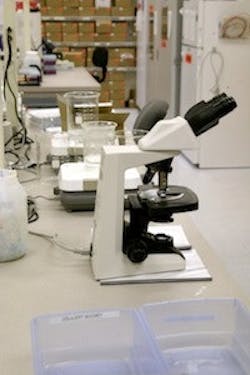Third Party Evaluates Ammonia, Nitrate Removal Technology
A new third party evaluation conducted by the Johns Hopkins University and the MWH Alliance has demonstrated that Microvi Biotechnologies’ biocatalytic technologies for nitrification and denitrification are effective in treating wastewater for nitrogen removal.
The study was performed at the Alliance laboratory, which is housed at the Johns Hopkins’ Bloomberg School of Public Health. The study evaluated Microvi’s MB-WWT and MB-N2 biocatalyst technologies in treating wastewater that contained ammonia and nitrate.
Results showed that Microvi’s biocatalyst technologies substantially reduced ammonia and nitrate in the water at lower treatment times than many conventional methods, with a reduced secondary waste stream.
MWH engages in the engineering, construction, and management of some of the largest and most technically advanced wet infrastructure, hydropower, mining and transportation projects for municipalities, governments and multi-national private corporations throughout the world. Microvi has partnered with MWH on several projects throughout Australia and Asia Pacific.
The third-party evaluation at Johns Hopkins examined the effectiveness of two of Microvi’s technologies.
MB-N2 utilizes biocatalysts to convert nitrate in water to nitrogen gas, a harmless byproduct, safely and efficiently. The MB-N2 technology is the first to degrade nitrate in water without producing a secondary waste stream and has dramatically lower treatment times and higher removal efficiencies than conventional systems.
Microvi’s MB-WWT technology is a low cost, small-footprint system that removes pollutants such as ammonia (NH4+) by completely degrading it into harmless products (N2 and H2O) by a special population of organisms as part of the MB-WWT biocatalysts.
Source: Microvi Biotechnologies
